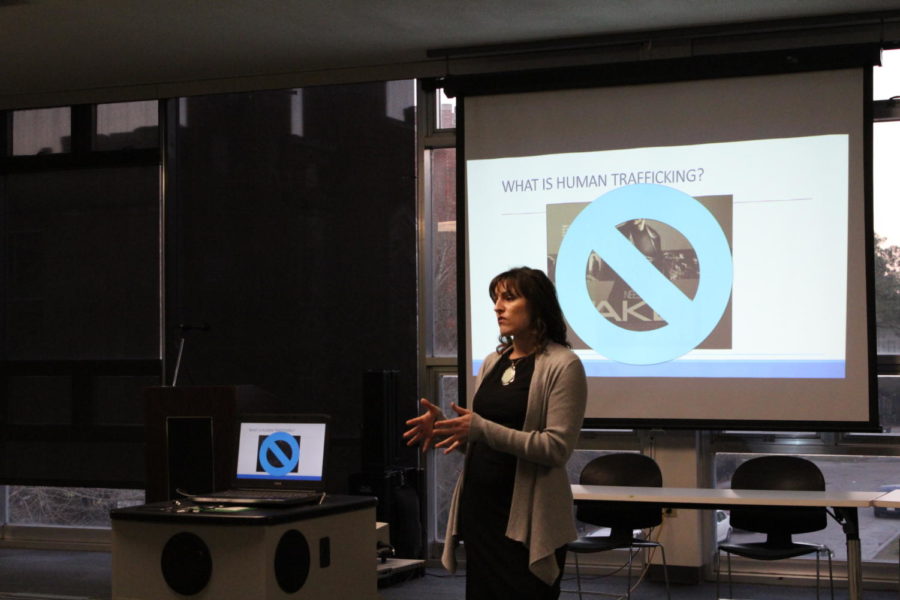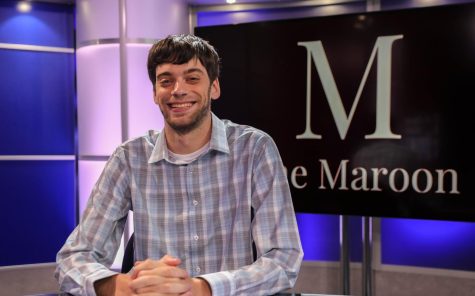Human trafficking forum fights social misconceptions
Leanne McCallum, task force coordinator for the Greater New Orleans Human Trafficking Task Force, presents in the Audubon Room on Jan. 11. McCallum used the movie “Taken” and a way to break down common misconceptions about human trafficking Photo credit: Hannah Renton
January 19, 2019
Though SGA President Sierra Ambrose is often involved in promotion of on-campus events, a Jan. 11 forum on human trafficking felt a little more personal than most.
“Growing up, I know that my mom told me a story about how she was almost raped and kidnapped, so that kind of fed into the reasons why I wanted to promote [the forum] and Take Back the Night,” Ambrose said.
Loyola’s Student Government Association, along with the Women’s Resource Center, hosted the forum on National Human Trafficking Awareness Day. More than a dozen people attended the event, held in the Audubon Room in the Danna Student Center.
Ambrose did most of the work to set up the forum, according to Patricia Boyett, director of the Women’s Resource Center. Boyett said Ambrose approached her the night before winter break with the idea to host the panel.
Susanne Dietzel, executive director of Eden House, a recovery home for victims of human trafficking, and Leanne McCallum, task force coordinator for the Greater New Orleans Human Trafficking Task Force, served as panelists. They broke down misconceptions about human trafficking and sought to raise awareness by explaining the issue more thoroughly.
McCallum used the movie “Taken” as a way to deconstruct some of the mainstream misconceptions surrounding conversations about human trafficking, and she pointed out possible consequences of those fictional narratives.
McCallum said human trafficking victims are not always white girls kidnapped by foreign nationals. Many people, she said, are controlled by other methods like economics or coercion. McCallum also explained that not all human trafficking is sex trafficking; many victims are also being used as forced labor.
“I think, in the past when we had framed human trafficking as an issue based on white slavery and based on kidnapping, what happens is that a lot of victims were never identified,” McCallum said.
She said accurate trafficking statistics are hard to find because many cases of human trafficking are misidentified as prostitution.
McCallum added that certain factors make New Orleanians more susceptible to human trafficking than other cities’ residents.
“With New Orleans — with the high poverty rate, with some of the issues with healthcare access, poverty, housing insecurity — there are a lot of vulnerabilities that our community members face,” McCallum said.
Ambrose said issues with human trafficking need to be addressed because even if students on campus feel separated from the problem, it persists close to home.
“[The issues] don’t just affect outside the Loyola community,” Ambrose said. “It also affects us, as well, because we are merged into Orleans Parish, so whatever affects them affects us.”
Music industry junior Syane Soriano attended the panel discussion and said it’s important for people to look at the complexities of human trafficking.
“It’s important because a lot of people just think sex trafficking is just people kidnapping girls and putting them in their trunk and then leaving,” Soriano said.
Ambrose said SGA hopes to plan a follow-up event, and she hopes last week’s forum helped educate people on how to help victims of human trafficking.
“Sometimes, it’s not always just standing in solidarity with them – that’s great – but also going the extra mile and making sure that there won’t be another victim,” Ambrose said.
Dietzel said she strives to shift the conversation about human trafficking, socially and politically, away from current attitudes that it is an issue to be resolved by a select few.
“This is way more than a women’s issue,” Dietzel said. “This affects us all.”








